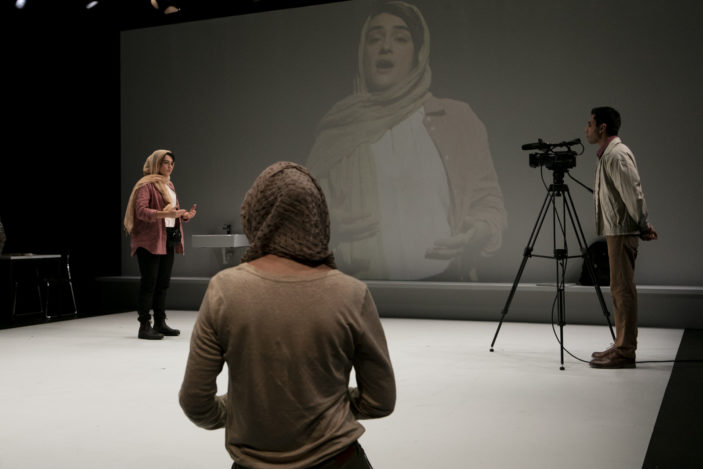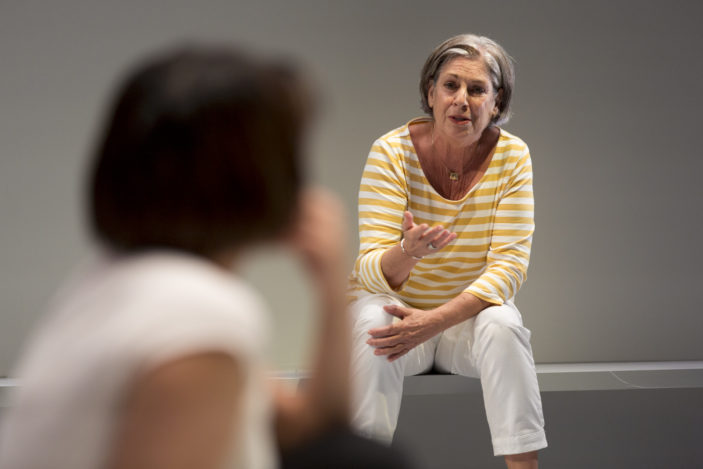
Trigger warning: review contains references to mental illness and trauma.
Sally Sara is a Walkley award-winning journalist, writer and author who has reported from more than 40 countries as a foreign correspondent with the ABC. Her debut play Stop Girl at Belvoir in Sydney is a powerful and compelling story of a woman’s struggle with mental illness after returning from Afghanistan.
We first meet foreign correspondent Suzie Broughton (Sheridan Harbridge) reporting from Afghanistan. She is self-assured, confident and seemingly in control in a world that appears very much out of control. Her childhood friend and colleague Bec (Amber McMahon) arrives to write a piece on her for the papers back home.
Between the two friends we’re presented with a striking contrast – while Suzie thinks nothing of gunfire or heading out on patrol through mine infested fields, Bec is jumpy, startled and refuses to participate. The use of the large screen backdrop to show the audience what is seen through the video camera wielded on stage is a brilliant piece of set design.
Once Suzie returns back home we see her struggle to settle in to “normal” life. When the two friends are reunited it is Suzie who is jumpy, startled and refusing to participate in everyday activities such as heading to the grocery store. As the trauma begins to take hold Suzie begins to isolate herself from those around her, including her mother Marg (Toni Scanlan) who provides a certain comedic lightness to the play which is a welcome relief.

There is also the parallel story of Suzie’s assistant from Afghanistan Atal (Mansoor Noor) who has fled his country to seek refuge in Australia. His excitement and joy at being in a place so different from his home, a place where he feels safe for the first time, is in stark contrast to Suzie’s despair.
She is plagued by the memories of the faces of those she saw die and feels trapped. She believes returning to Afghanistan will help her break free of this feeling, unaware that it is her mind that is trapped.
Beautifully directed by Anne-Louise Starks, there are certain moments throughout Stop Girl that are absolutely heartbreaking. It is only once Suzie becomes vulnerable about her experiences to those around her, including a psychologist (Deborah Galanos) that she starts to heal.
As she lists everything she has witnessed as a foreign correspondent, every horror and atrocity, you can’t help but wonder if this is Sally Sara speaking directly through the character she has created. How much of what we’re seeing is fact? It is a question too terrifying to contemplate.
Each member of the cast give an incredibly moving and memorable performance. Noor is perfectly cast as the softly spoken Atal whose calm wisdom is a balm throughout the play and the dynamic between McMahon and Harbridge is believable and genuine. But it is the relationship portrayed between Scanlan and Harbridge that really steals the show.

Initially depicted as a typical mother – daughter dialogue (worrying mother, reassuring daughter), as the performance progresses this dynamic shifts. Culminating in the final scene of the play, which I believe is one of the most powerful, we see two women connect in a way that is deep and honest.
Having spent the majority of the play insisting that not connecting is what keeps you safe, it’s how you move past the pain of what you see, Suzie’s vulnerability in that moment with her mother is what saves her. It is all at once beautiful and heartbreaking, emphasising our basic human need to connect to people.
Although slow to start, Stop Girl is an intensely raw and confronting look behind the lines of a foreign correspondent. Sara has created a piece of work that is incredibly relevant and at a time where conversations about mental illness are increasingly important. Stop Girl will make you think and leave you a little shaken.
![]()
![]()
![]()
![]()
![]()
THREE AND A HALF STARS (OUT OF FIVE)
Stop Girl will perform at Belvoir in Sydney until 25 April. For more information and to buy tickets head to the website.
Reviewer attended on 26 March 2021. Photos by Brett Boardman.
